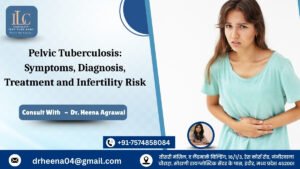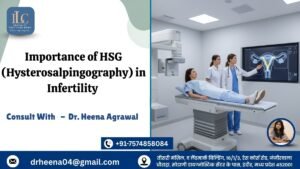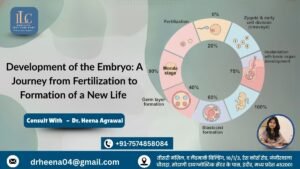In-Vitro-Fertilization (IVF) is one of the most widely discussed fertility treatments out there. In women under 35, it offers the highest success rates. But what does it Involve? This ‘Beginners
to IVF’ is going to give you an insight into what to expect from IVF treatment, in a straightforward and simple format.
What is IVF?
In short, IVF involves fertilising an egg with sperm in an incubator, with the aim of achieving a pregnancy.
After stimulation,
Eggs are collected from the ovaries following stimulation with drugs. The eggs are then fertilised with sperm in the laboratory. The fertilised egg (embryo) is then allowed to develop for up to 5 days, before being transferred back into the womb.
Who Requires IVF Treatment?
After your initial tests, our IVF expert DR HEENA AGRAWAL will review your results and advise you on the best fertility treatment options for you. Patients are often surprised to hear that IVF, is not the only treatment option available to them. That said, IVF is usually the first fertility treatment for patients with certain conditions.
These conditions commonly include tubal ligation, tubal disease or severe male infertility. In the case of tubal ligation or tubal disease where tubes are blocked, a pregnancy can be achieved by bypassing the fallopian tubes.
Other diagnoses where IVF treatment can increase the chances of a successful pregnancy include endometriosis, advanced age, ovulatory disorders, unexplained infertility and delay in conceiving. Treatments such as intracytoplasmic sperm injection (ICSI) allow one healthy sperm to be injected into an egg, allowing patients the opportunity to overcome male infertility.
Read on to find out more about the key steps in the IVF process…
The IVF Treatment Process
Step 1:
Enquiry
It is not necessary for you to have a referral from your GP in order to begin treatment with The Fertility Partnership. You can self-refer by getting in touch via our CONTACT US page.
Step 2:
Preliminary Tests
For your doctor to make an informed decision about your treatment at your first consultation, they will need some preliminary test results. These tests include an ovarian reserve and semen assessment.
What’s involved in infertility testing?
Tests for ovarian reserve include:
• AMH test (anti-Müllerian hormone)
• Transvaginal scan (internal scan) to count the number of follicles (small fluid-filled sacs)
Further Tests may be required based on the type of fertility treatment that you require. These could include:
• Tubular patency test (HyCoSy)
• Saline sonogram and 3D scan (to assess the cavity of the womb)
• Sperm Analysis
• Screening for infectious diseases (this is required prior to starting fertility treatment)
If you have had these tests done elsewhere, we will happily assess whether we are able to accept these results. Test results must be dated within a year of you submitting them to us and in some cases, within three months. Depending on the outcome, we will inform you if we are able to accept your existing results.
Step 3:
Initial Consultation
During your first consultation, you will discuss your clinical history and test results (if available) with your consultant. Your consultant will then be able to recommend the best treatment programme for you, based on your clinical and personal.
Schedule an appointment today
Step 4:
Consenting Appointment
Before beginning your treatment, you will need to attend an appointment with our nursing team, in order to further discuss your treatment plan and to sign the necessary consent forms. If a couple is receiving fertility treatment, then they will both need to attend this appointment.
Within this appointment, your nurse will explain how and when to take the necessary medication for your IVF treatment. After this appointment, you will need to pay for your treatment programme, before you are able to begin your cycle.
Step 5:
Counselling
Depending on your treatment path, you might be recommended counselling before starting treatment. If not, whenever you need them, counselling sessions are available to you during your treatment.
We recommend that all our IVF patients seek counselling during their IVF treatment. Counselling provides patients with additional emotional support, during what can be an important and emotional journey. All counselling sessions are completely confidential.
If your treatment plan requires you to use donated eggs or sperm, then you will be encouraged to see a counsellor, prior to your treatment. This enables you to discuss and work through the implications of donation on yourself, your partner (if applicable) and any existing or future children
Step 6:
Beginning Treatment
On Day 1 of your period, you will need to call your clinic on the telephone number provided to you. You will be instructed to begin the treatment plan, which you have discussed in-depth during your consenting appointment with a member of our nursing team.
It may be necessary for you to regulate your cycle by taking medication prior to starting the treatment.
Step 7:
Stimulation
An important part of your IVF treatment involves stimulating the ovaries, in order to allow us to collect multiple eggs. Naturally, your body will typically release one egg during your monthly cycle and so to collect more than one, stimulation is necessary.
What is involved with stimulation?
To stimulate your ovaries, you need to administer injections at home – during an earlier appointment you will be shown how to do this, our Patient Support Team are also on hand if you need further assistance.
During the first 2 weeks of your stimulation, the growth of egg-producing follicles will be monitored. The clinic will conduct this monitoring through scans (typically 1-3 scans) and blood tests.
Appointments for this are held at the clinic and they are typically short (around 20-30 minutes) and the results will become available on the same day. The exact timings of these appointments will be tailored to the individual needs of each patient.
Step 8:
Stimulation Period Ends
The monitoring of the growth of your egg-producing follicles will allow us to know when the best time is to end your stimulation period. In order to end your stimulation process, a trigger injection needs to be administered as this matures the eggs within the follicle, making them ready for collection. We will advise you of the optimum time, to administer this injection.
Typically, 80% of follicles contain an egg.
Step 9:
Egg Collection
In the hours following your trigger injection, you will have an appointment for your eggs to be collected.
During your appointment, you will undergo a procedure in theatre, for which you will be given a sedative. The sedative is mild and will cause you to become sleepy.
The procedure will take around 30 minutes, after which you will rest at the clinic before being allowed home the same day.
Due to the sedative that you will be administered, you will not be permitted to drive yourself home and so we advise you to arrange for someone or a taxi to pick you up.
What happens during the IVF egg collection procedure?
The consultant will use a vaginal scan probe, with a fine needle attached to it, to pass through the vagina to collect the eggs from the ovary.
Step 10:
Sperm Collection
Depending on your treatment, your means of sperm collection will be determined before you begin your IVF treatment.
What are the ways to provide sperm for IVF treatment?
Option 1: Fresh sperm sample.
If using a fresh sperm sample during your treatment, the sample will need to be provided at the clinic in an andrology room, on the same day as your egg collection.
Option 2: Surgical Sperm Retrieval
If your treatment requires surgical sperm retrieval, this will happen prior to egg collection. The sample retrieved will then be frozen, before being thawed on the day of egg collection.
Option 3: Stored Sperm Sample
If you already have a frozen sperm sample in storage, this will be thawed on the day of egg collection.
Option 4: Donor Sperm Sample
If your treatment requires you to use a sperm sample from a sperm donor, this will be thawed on the day of egg collection.
Step 11:
Insemination
Once egg and sperm collection has taken place, insemination can occur. The sperm sample provided is tested to select the best sperm for use during insemination. The way in which insemination occurs is different, depending on your treatment plan.
IVF (In Vitro Fertilization) Insemination
IVF insemination involves both the eggs and sperm being added into a culture dish. This dish is then placed into an incubator, where fertilization can occur. This culture dish remains in the incubator until embryo transfer (Stage 13).
Intra-Cytoplasmic Sperm Injection Insemination (ICSI)
ICSI insemination involves a single (pre-selected) sperm being injected into each egg. Each egg is then placed in a culture dish where fertilization can occur. This culture dish remains in the incubator until embryo transfer (Stage 13).
Step 12:
Embryo Development
Shortly after egg collection, you may start taking drugs that help prepare the lining of your uterus to receive an embryo and support your pregnancy.
Development monitoring
The embryos are carefully monitored in the period after insemination by the embryologists: first to check for fertilization, then for signs for development which indicate the embryo is growing.
Time-lapse Monitoring
Time-lapse monitoring enables our Embryologists to closely observe the development of every embryo, without it needing to leave the incubator.
Step 13:
Embryo Transfer
Your consultant will decide the best time for your embryo transfer to take place, typically this will occur 5 days after your egg collection. Factors such as the number and quality of your embryos are taken into consideration by the consultant.
What happens during embryo transfer?
During the embryo transfer procedure, a catheter is used to deposit a drop of culture medium, which contains one or two embryos (depending on your treatment), in the uterus. The procedure typically takes around 15 minutes and some patients have compared the feeling experienced, to being like a smear test. The embryo transfer will be carried out under ultrasound guidance.
At this stage, your good quality embryos that are not used during your transfer can be stored for further cycles.
Step 14:
‘The Wait’
Step 14 is a two-week wait to see if your embryo transfer has been successful. Typically you will need to wait 15 days after egg collection before you take a pregnancy test.
During this time, we will call you to check in on you and discuss any worries. You are actively encouraged to live life as normally as possible during the wait and to contact us if you have any concerns or worries that you would like to discuss.
Step 15:
The Results
After waiting for the allotted time, you will take a pregnancy test to discover whether your embryo transfer has been successful or not.
Negative Pregnancy Test
If the pregnancy test is negative, we will discuss with you the next steps of your treatment and the options available to you. The average success rate for an IVF treatment cycle in India sits at 30%.
IVF often takes place over several cycles; if you have frozen embryos then you could be ready for a new cycle within a few months. It is also important to note that, your chances of success increase with the number of cycles you go through.
The way forward after a negative test is always up to you and we will support you in any decision you wish to make.
What if your period arrives before the pregnancy test is due?
If your period arrives before the pregnancy test is due, the process is the same as if you had received a negative pregnancy test.
You will need to inform us that you have started your period, from there we will discuss with you the next steps of your treatment and the options available to you.
Positive Pregnancy Test
If you receive a positive pregnancy test, we will schedule you in for a scan at the clinic, at roughly 6-8 weeks. If all is well, you can then be discharged into the care of your GP.






